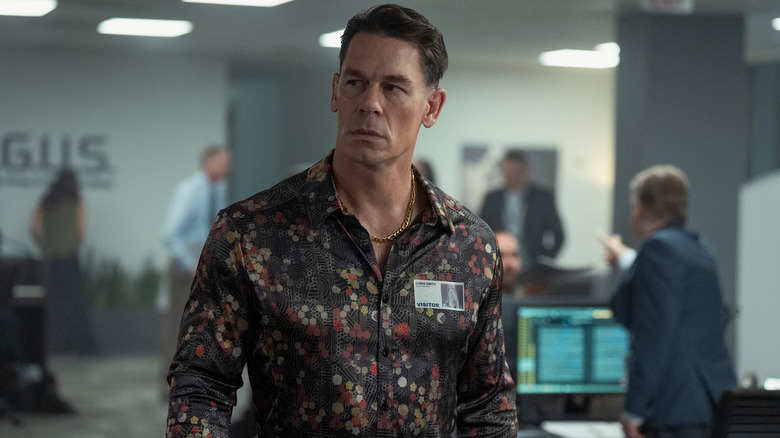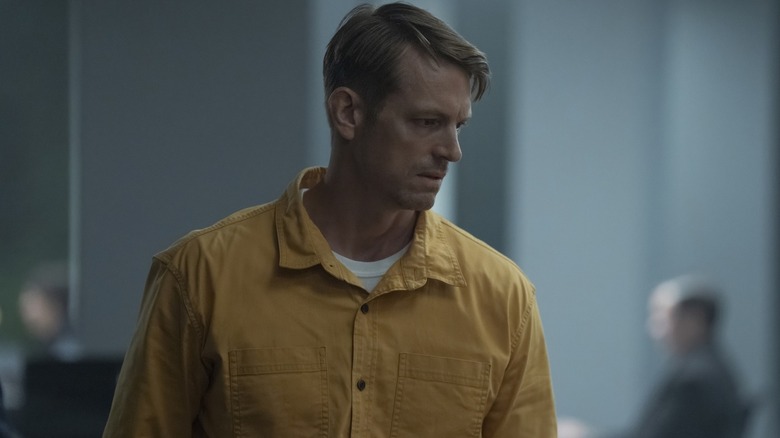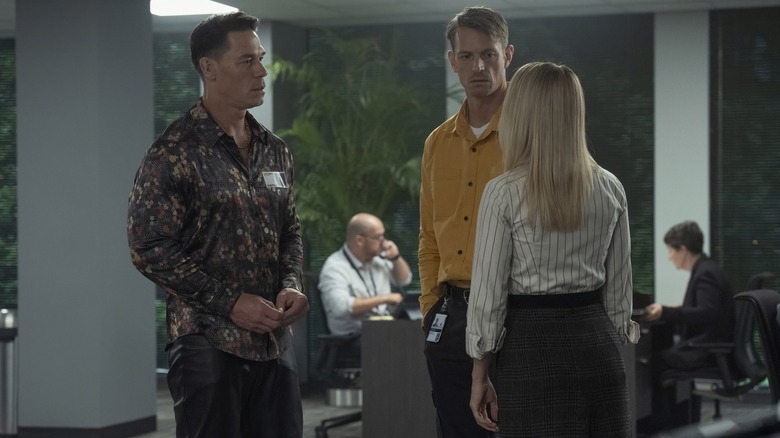Peacemaker Season 2 Is Still Very Much A Sequel To James Gunn's The Suicide Squad
This article contains spoilers up through to "Peacemaker" season 2, episode 4, "Need I Say Door."
The concept of an ongoing multi-franchise film series — what we've come to refer to as a "cinematic universe" — is still relatively in its infancy. Despite the decade-and-change existence of things like the Marvel Cinematic Universe and the Conjuring Universe, there is still a lot of experimentation and wiggle room as to how each property chooses to handle its growing continuity. The longest running franchises, such as the James Bond movies, the "Halloween" films and others, have tended to choose a moment to break continuity with the past, presenting certain new installments as starting points, whether through the means of a remake or a reboot. This can be the quickest and cleanest way of starting fresh, but while this move frees up the narrative, it means that some of the thematic and emotional resonance that a property gains over time could be lost.
James Gunn and Peter Safran's DC Universe, born from the ashes of the DC Extended Universe, is a fascinating case of an ongoing universe treading a new path when it comes to continuity. While most of us initially assumed that Gunn's "Superman" (and "Creature Commandos" before it) would mark the breaking off point for the defunct DCEU, the second season of "Peacemaker" has proven those assumptions erroneous. As seen in the season so far, it feels like Gunn is taking a parallel universe approach to merging the DCU and the DCEU. That is to say that we can assume that events in that universe did transpire the way we saw them previously, unless otherwise stated. So, Gunn's "Superman" acts as a reboot of that title character, as the film makes clear that this is not the same Superman who endured the events of "Man of Steel," "Batman v Superman: Dawn of Justice," and so on. Yet, "Peacemaker" has only retconned a couple elements, and we've taken a look at what's been changed. Here's what has remained the same: "Peacemaker" is still very much a sequel to Gunn's "The Suicide Squad," not just in lore but also in terms of its emotional and thematic continuity as well. In fact, a large portion of this new season deals with the fallout of choices made in "The Suicide Squad," specifically the murder of Rick Flag Jr. (Joel Kinnaman), which is both an exciting and narratively responsible decision on Gunn's part.
Moving from the DCEU to the DCU isn't a get out of jail free card for Peacemaker
Part of the artistic motivation for Gunn to make "Peacemaker" following "The Suicide Squad" is as a continuation of his career-long look at underdogs and misfit characters. As with "The Specials" and "Super," Gunn's "The Suicide Squad" is about a group of B- and C-list superheroes and antiheroes whose morals are decidedly all over the place. The most loathsome of the group, at least when it comes to morality, is Peacemaker (John Cena) himself, who, without question, follows the orders of the Squad leader Amanda Waller (Viola Davis) to cover up all evidence of American involvement in a secret government project. One of the ways in which Peacemaker attempts to ensure this is by murdering Flag, who was prepared to go against Waller's orders once he discovered the truth behind Project Starfish. While Peacemaker is not the main villain of "The Suicide Squad," he's essentially the turncoat character, who in some ways is even more risible to audiences. So "Peacemaker," then, is Gunn's experiment to see if he can take such an unlikeable character and make him a beloved protagonist of another project.
Given the reception to both the first and now second season of "Peacemaker," one could certainly say that mission has been accomplished. What's impressive is how Gunn had an obvious and easy clean slate to use for the titular character (and the show's whole ensemble of ne'er do wells) with the series' move from the DCEU to the DCU. It would've been very possible for Gunn to say that "The Suicide Squad" never happened to this new DCU Peacemaker, or that it happened in a different way, and so on. Instead, Gunn is leaning into the connection to the 2021 film and is twisting the emotional knife even harder. Now, Peacemaker doesn't just have to reckon with murdering Flag Jr. and contend with the subsequent search for revenge that Rick Flag Sr. (Frank Grillo) is undertaking against him. He also must reconcile the fact that the woman he's fallen in love with, Emilia Harcourt (Jennifer Holland), was Flag Jr.'s lover before he died. Then there's the matter of the alternate universe that Peacemaker has found thanks to his father's stolen tech, in which Flag Jr. is still alive and is in a relationship with that universe's Harcourt, who used to be involved with that universe's Chris AKA Peacemaker, whom our universe's Peacemaker killed in self-defense earlier this season. By keeping the repercussions of Chris' mistake alive while also introducing a parallel instance of Peacemaker killing the wrong man (a version of himself, damn the subtlety), Gunn is using the material made for the DCEU to feed the DCU in a clever and emotionally vibrant way.
What else could be retained in the DCU from the DCEU?
While all of this can seem confusing, we generally know where the events of "Peacemaker" and its core characters stand. The jury is still out, however, on which other characters and future projects within the DCU will cherry-pick elements from the DCEU to carry forward. The chances are that the big marquee characters, i.e. Superman, Batman, The Flash, and so on, won't be in any sort of continuity with their DCEU exploits. Yet, Rick Flag Jr.'s admission of dating June Moone aka Enchantress from 2016's "Suicide Squad" (played by Cara Delevingne) in "Peacemaker" begs the question whether that movie is also still loosely part of the DCU's continuity. We know that Gunn has gone on the record to confirm that "Blue Beetle," the 2023 DCEU film, is still mostly canon to the DCU, too. So, that's at least two, and potentially three, DCEU movies that retain canon elements for the DCU going forward.
The big question is whether this piecemeal approach to building out the DCU will end up paying off or if it might become a bigger headache than it's worth. There's no doubt that general audiences are far more primed to understand these advanced storytelling mechanics than they would've been a decade or so ago, especially thanks to the MCU's multiverse saga bringing over a bunch of previously established heroes, like Patrick Stewart's Professor Xavier and Wesley Snipes' Blade, to its recent entries. While it's likely that Gunn himself will get a headache or two upon speaking to the media about who and what is canon (if he hasn't already), the secret to all of this in the long run is something that the filmmaker has already discovered, which is that it ultimately doesn't matter as long as the choices serve the story and character in a compelling way. It's one thing to keep continuity merely to appease the literal-minded. However, "Peacemaker" illustrates that Gunn wasn't interested in taking any shortcuts or ticking off boxes, but instead wished to retain the moral and emotional weight and tension that makes "Peacemaker" so compelling. While it's still unclear how much Chris can be trusted, it's obvious now that the audience is in great hands with Gunn and "Peacemaker."
New episodes of "Peacemaker" roll out Thursdays on HBO Max.


